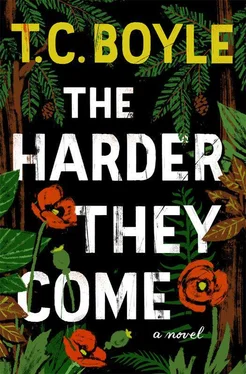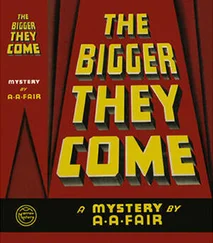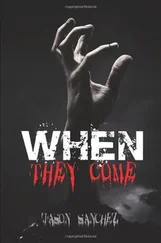“You expect me to serve you?”
“Damn straight I do. I am the guest, after all, aren’t I? I mean, I serve you at my house—”
They were teasing back and forth, bantering, and it was perfect, just what she needed, the fire going in the stove, rain at the windows, Kutya curled up asleep on the rug and dinner three shakes from being done. “Right,” she called, pausing to take a sip of her own wine and then douse the fish with the rest of it, “and when was the last time that happened?”
She was cooking up the two dozen smelt one of her clients had given her — he was rich, in his sixties, and when he wasn’t riding he was out on his boat, catching fish — and they were the simplest thing in the world: gut them, wash them, roll them in flour and sauté them whole with a little salt and pepper. High-protein, low-cal. She was serving a garden salad on the side and those Pillsbury dinner rolls that took fifteen minutes in the oven. After dinner they’d watch one of the DVDs she’d checked out of the library on her way back with the fish. Or maybe both of them, one a so-called comedy and the other horror, though she didn’t feel much like horror tonight. Maybe they’d just turn in early. And if Adam had snuck out of the house yesterday morning before she even got up and took the bourbon with him too, she wasn’t missing him, not with Christabel here and everything so slow and calm and easy. Or that was what she told herself, anyway. He’d show up when he was ready — and this was the kind of weather that made camping a pure misery, so most likely it wouldn’t be long. But let him take his time — she wasn’t tied to him. She had a whole life of her own. When he showed, he showed, why worry about it?
She tipped the fish onto a serving plate and set the plate on the table next to the salad, then pulled the rolls from the oven, letting the sweet warm wafting scent of them fill the kitchen even as the rain whispered on the roof and feathered the windows. “You want water?” she called.
“What would the French say?” This was one of their jokes, having once been suckered into watching a French movie on Netflix that had gotten good reviews but turned out to be all but incomprehensible despite the subtitles, because the French, they concluded, had different values.
“The French would say, ‘ Non .’ They’d say, ‘Pour me some more wine.’”
“ Oui, oui, ” Christabel said, rising from the chair now, “more wine.”
They pulled two chairs up to the stove, the door of which she’d left open so they could watch the fire crackling inside, and settled in, plates in laps. Kutya was interested suddenly and though she told herself she wouldn’t have him begging she couldn’t help feeding him a sliver or two of fish in between bites. He took it daintily, with the softest jaws in the world, bolted it down and looked up expectantly for the next morsel to come his way.
“This is good,” Christabel said, as if she doubted herself. “Really good. I don’t think I’ve ever. . I mean the whole fish—”
“You don’t think about it, though, do you? After the first one.”
Christabel, chewing, staring into the stove, just nodded.
This was the kind of meal Sara loved, no chemicals, no BHT or food coloring or (the worst) corn syrup, just natural food, come by naturally. Except for the rolls, but she just didn’t have the time or energy to make them from scratch, having worked outside in the rain half the day, but the fish were fresh-caught right down there on the coast and the butter lettuce, cherry tomatoes, cucumbers and radishes had come from her own garden. And the fish were free, which made it even better, free for the taking. Like mussels. She loved nothing better than to just pull over and make her way down a path to the sea at low tide, cut a bunch of mussels from the rocks (but not in summer, when they were quarantined because of the possibility of paralytic shellfish poisoning, which was fatal, thank you), and then steam them up and serve half as a starter with butter and garlic and homemade bread and then toss the rest into a pot of marinara at the last minute so you didn’t have to worry about them getting overcooked and rubbery. And berries. Nothing better than gathering berries in late summer for pies and tarts, but then you had the calorie factor to worry about. Berries with a little half-and-half then. And the smallest sprinkle of sugar.
When they were done, Christabel insisted on washing the dishes but she told her no, just let them sit, because why spoil the evening with something so — what was the word? — boring . Or no, tedious . “Too tedious,” she said, and she liked the sound of it and added, “Don’t be tedious. Let’s be the opposite — what is the opposite of tedious, anyway?”
Christabel let out a laugh. “I don’t know, untedious ?”
They talked about having an after-dinner drink — Bailey’s, she had some Bailey’s in the cabinet, but that stuff packed on the pounds like steroids. “They ought to give that to the cattle at the feedlots,” she said. “That’d fatten them up. Pronto.”
“Yeah,” Christabel said, giving her a sloppy grin, “but what would the French say?”
“They’d say ‘Make mine rare.’”
“Right. And then they’d say, ‘Let’s stick to wine.’”
So they stuck to wine, how many glasses neither of them could say, but the quantity turned out to be exactly the precise amount to make the so-called comedy funny — or, that is, to prime them to the point where they could get sarcastic and laugh at it, which, as it turned out, made it genuinely funny.
They were both laughing when they heard the sirens, and before they could even get up out of their chairs or pause the video or shut the stove so they wouldn’t have to worry about sparks, the front door, which had been locked — she was pretty sure it had been locked — burst open as if it was made of cardboard and there were cops everywhere, shouting, “Your hands! Let me see your hands!”
She’d been a fool, that was her first thought, worse than a fool, because she of all people should have known they’d never let it go because once they got their claws into you, you had no more status than they did, and not packing up and moving to Nevada when she had the chance was just about the stupidest thing she’d ever done. What was wrong with her? What had she been thinking — that they’d forget about it? That if she stuck around, Adam would give up on the woods and come back to her? That it would be too hard, too much of an effort, to pull up her stakes here? She’d been lazy, that was what it was, living in fantasyland, and she was getting just what she deserved, because here they were with their boots and guns and bulletproof vests and there was no way out now.
She had her hands in the air. Christabel, who looked as if she’d been flash-frozen, had dropped the wine glass on the rug in the shock of the moment and she had her hands in the air too. And Kutya, Kutya was going bonkers. “Lady,” one of the cops yelled at her, “will you control that animal?”
At first she couldn’t understand what he was saying because they’d come to take Kutya away from her, hadn’t they? Wasn’t that what this was all about? That and maybe her no-show on the seatbelt thing. And the court date on the trumped-up DUI charge, to which she’d pleaded innocent, but that wasn’t for two weeks yet, not that she had any intention of showing for it. . or hadn’t had. Until now. But wait — and here her blood froze — what about that little incident the other night with the police cruiser and the sugar water meant for innocent hummingbirds? They’d caught her on videotape, she was sure of it, because everything in the U.S.I.G.A. was on tape now, every breath you took, and what about the Fourth Amendment, what about that? Search and Seizure? Hello?
Читать дальше












